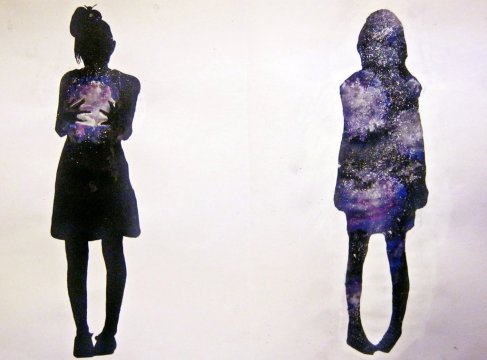Artwork by Winnie Truong
I’m sure you’ve heard people say things like “you need to live in the moment”, but what does that actually mean? I’ve come up with a couple interpretations that might help solve this question. I personally tend to think of the question in a metaphorical kind of way where “living in the moment” isn’t some sort of mental state that you can pull up through vigorous meditation sessions, to me, it’s more the act of letting go.
Throughout life, we hold on to our own tragedies whether they’re self-inflicted or events that happened. There’s no problem in acknowledging everything that has happened to us over the years, but there is a problem when you let such things hold you back. You may not even be aware that there’s an element from your past that’s preventing you from moving forward wholeheartedly. For myself, it was an acknowledgement that I was being too hard on myself thinking that I should be “better than this”. That sort of idealization of who I wanted to be and where I wanted to go ended up being detrimental to where I was.
Another thing that helped me was when I realized that people generally just want to do what they think is right even if that “right” is a false positive. After realizing this, it became harder to hold on to small grudges that I had because it’s harder to see someone negatively when you observe their perspective. Of course, that doesn’t apply to everyone and everything, but you get the point.
To me, letting go of your past so you can move forward is what living in the moment means. But, that’s not to say that I think that that’s all it means (I’ll get to that later on :P). It’s easy enough to say “let go of the past” but how can you go about doing this? This is one of those “easier said than done” types of situations, because it means you’ll likely have to relive some of your past in order to understand it better.
Just analyzing your past may not necessarily be enough (but it’s a good starting point), you may need to adopt a different way of looking at it. Consider the idea of forgiveness. That word gets thrown around a lot and it’s largely a misunderstood concept. When you forgive someone, a situation or yourself, it’s not necessary for the other person to deserve that forgiveness (but it helps), it’s about allowing yourself to let go. Forgiveness is a process that you do to yourself, for yourself.
Artwork by Winnie Truong
You can’t very well say a thing like “I forgive myself” and expect it to come true, you need to find the means in which to convince yourself that the forgiveness is justified. Otherwise, you’re just blindly accepting something without understanding why. The “why” part is important in understanding. When I was trying to work on my process of letting go, I had to change the way I saw situations. The goal was to remove myself from the situation so that I can see it clearer.
I was trying to look at it my situation through someone else’s eyes in a way. If you consider the past, not just your past, but everyone’s past, it’s obvious that there’s a lot of history and in order to understand someone (finding the “why”), you need to look at their past. Here’s a vague little nugget, but it might give you a better picture…
I think that the majority of you know the extent of damage abuse does to a person (if you don’t, google is just a quick click away) and if you consider that it’s really only been addressed in the past few decades, you can develop a picture of what the history of a lot of people might be. You may not have personally been whipped by a belt as a kid from a drunken father or lashed by a ruler from a school teacher, nun or priest (of course this doesn’t necessarily apply to all cultures, but the abuse is the same). Now if you go back even further, the level of abuse and traumatic events go up much higher. You can take the child mortality rates of the past and apply it to the damaged families. All that history comes back to you because it’s an echo.
Your parents may demonstrate passive aggressiveness, lashing out, show little patience, so on…as part of their learned experience of what “works” and what’s “right” because their parents showed a more extreme version of that which lead them to where they are now. Their parents before that and so on. It’s slowly going away because of the mass cultural shift we’re going through where abuse of any form is no longer acceptable. That doesn’t mean that things are better by any means because we’re faced by different problems than what we’ve faced before as people. But, this view of things, this story of the echo of abuse, it gives you a better idea of why certain people might treat you a certain way.
Artwork by Winnie Truong
For me, understanding was the key in letting go of my past so that it doesn’t affect my present and future. It was through understanding and asking “why” that led me to the forgiveness of my own downfalls and the downfalls of others. However, I will always be working on this “living in the moment” thing.
I hope this was useful.













